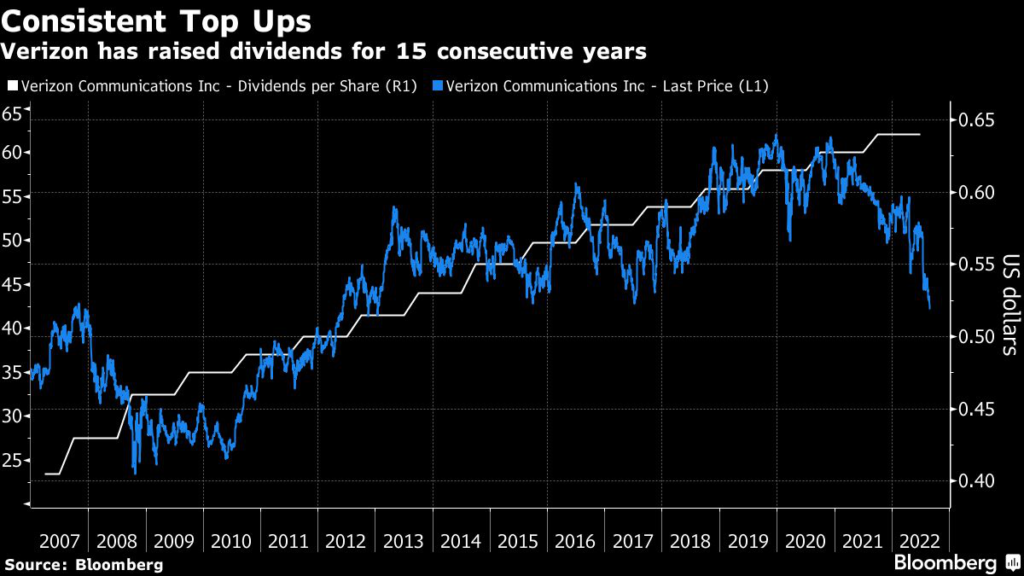Verizon Communications Inc. has cut its forecasts twice this year and the stock has tumbled, adding to its decade-long underperformance against the broader market. Plenty of contrarians are betting the worst is past for the mobile-phone giant.
(Bloomberg) — Verizon Communications Inc. has cut its forecasts twice this year and the stock has tumbled, adding to its decade-long underperformance against the broader market. Plenty of contrarians are betting the worst is past for the mobile-phone giant.
The big appeal: Verizon’s juicy dividend yield and history of raising the payout. That cash return looks especially appealing with tech and telecom stocks broadly slumping and the economy teetering on the brink of recession.
Funds run by Capital Group, Federated Hermes Inc., Invesco Ltd., GQG Partners and other firms snapped up millions of Verizon shares in the three months ended June 30, regulatory filings show. Those bets proved to be premature, since the company in July lowered its forecast for the second straight quarter, sending the stock plunging.
But those value- or dividend-oriented investors are betting Verizon will manage to revive subscriber growth even in the face of aggressive phone discounts and decades-high inflation.
Verizon has plenty to prove. The stock has fallen 21% this year, closing Friday at its lowest since June 2012. Rival T-Mobile US Inc. has been a surprise winner, up 22%, and AT&T Inc. has declined only 7.4%.
What sets the company apart from its rivals is its consistent dividend, and investors got more proof of that on Tuesday as the company raised its payout for the 16th straight year. The stock yields 6.3%. While that’s less than AT&T’s 6.5%, the latter has slashed its dividend by nearly half this year. T-Mobile doesn’t pay a dividend.
“T-Mobile is not a dividend payer and Verizon is a very consistent 5% dividend payer,” said David Bahnsen, chief investment officer at the Bahnsen Group, a wealth management firm with $3.7 billion in assets. Verizon’s “dividend is sustainable and will continue to grow,” said the investor, who owns a Verizon stake.
Verizon, the largest US wireless carrier, is taking steps to keep up with rivals on subscriber growth amid heavy phone discounts and decades-high inflation. It has launched phone plans to cater to budget-conscious customers and is working on ramping up its so-called fixed wireless business, a relatively new segment of broadband service where signals are beamed directly to a home WiFi router.
Contrarian investors can take comfort in the fact that Wall Street is nearing maximum bearishness on the stock. Fewer than 25% of the analysts covering Verizon have a buy rating on the stock.
“Verizon is well-positioned to benefit from ongoing 5G wireless subscription growth along with its leading position in prepaid wireless and new growth opportunities in fiber and fixed broadband connectivity,” said one of the bulls, Ivan Feinseth of Tigress Financial Partners.
The telecom industry is capital intensive and Feinseth says that “Verizon’s strong balance sheet and cash flow enable ongoing investment in spectrum expansion and growth opportunities.”
Verizon trades at 7.9 times estimated earnings, its cheapest in two decades, making a bargain for stock pickers looking for a healthy dividend yield. Skeptics say they’re not convinced the company is ripe for a turnaround.
“Certainly they’re cheap. But while the valuations are not demanding, we worry that they’re value traps, and that they will only get cheaper,” said Matt Peron, director of research at Janus Henderson. “Just because something has a high dividend yield doesn’t mean its a good stock.”
Tech Chart of the Day
Big Tech stocks have split in two groups since the Nasdaq 100’s June low. Apple Inc. and Amazon.com Inc. have proved resilient, leading the rally and faring better in the subsequent selloff since mid-August. Microsoft Corp. and Alphabet Inc., though, have underperformed, with their stocks pressured as the software giant attempts to combat a stronger dollar and the Google owner tries to navigate a cooling advertising market.
Top Tech Stories
- Amazon.com Inc., which is struggling to quell workplace movements from the US to Europe, faces a growing union effort in Asia’s second-largest economy.
- CVS Health Corp. has reached a deal to buy home-health and technology services provider Signify Health Inc. for about $8 billion, as the drugstore chain expands further beyond its retail origins.
- Sony Group Corp. is set to lose its longtime PlayStation hardware architect Masayasu Ito, who will retire at the end of this month.
- HappyFresh’s board hired turnaround firm Alvarez & Marsal Holdings LLC and is conducting a review of the online grocer’s financial situation, according to people familiar with the matter.
- Binance, the largest crypto exchange by volume, will start converting any existing user balances and new deposits of USD Coin, Pax Dollar and True USD into the company’s own stablecoin, according to a statement published on Monday. The conversion is scheduled to begin Sept. 29.
- Contemporary Amperex Technology Co. Ltd. has taken full control of a Chinese lithium carbonate project as the battery giant seeks to shore up supply of the ingredients used in electric car cells.
(Updates with Verizon’s dividend raise in paragraph six.)
More stories like this are available on bloomberg.com
©2022 Bloomberg L.P.











